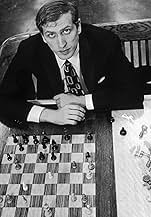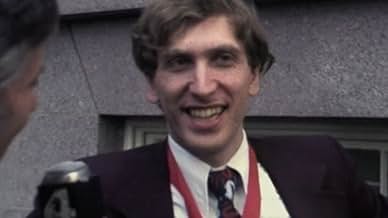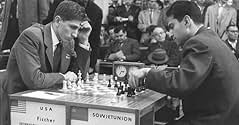'Bobby Fischer Against the World' is a documentary feature exploring the tragic and bizarre life of the late chess master Bobby Fischer. The drama of Bobby Fischer's career was undeniable, f... Read all'Bobby Fischer Against the World' is a documentary feature exploring the tragic and bizarre life of the late chess master Bobby Fischer. The drama of Bobby Fischer's career was undeniable, from his troubled childhood, to his rock star status as World Champion and Cold War icon, t... Read all'Bobby Fischer Against the World' is a documentary feature exploring the tragic and bizarre life of the late chess master Bobby Fischer. The drama of Bobby Fischer's career was undeniable, from his troubled childhood, to his rock star status as World Champion and Cold War icon, to his life as a fugitive on the run. This film explores one of the most infamous and myste... Read all
- Nominated for 1 Primetime Emmy
- 1 win & 5 nominations total
- Self
- (archive footage)
- Self
- (as Dr. Anthony Saidy)
- Self
- (archive footage)
- Self
- (archive footage)
- Self
- (archive footage)
- Self
- (as Fernand Gobet PhD)
Featured reviews
Garbus's formula is a standard one but succeeds brilliantly here. She juxtaposes archival footage and still photos (much of which, I believe, has never been shown publicly before) with contemporary interviews of many of the key players from Fischer's two-decade pursuit of the title. These individuals - fellow chess players (several of whom were his boyhood friends), tournament organizers, journalists, even his bodyguard - were all members of the small cadre of people that Bobby allowed into his life. Many were even part of his inner circle at Reykjavik. To a person, then, the interviewees were uniquely qualified to share their recollections of Bobby. But, beyond that, they had been positioned to gain some understanding of Bobby. In this film, they share that understanding, or at least their attempts at understanding, of who Bobby Fischer was, and more importantly, why he was that way.
One can only try to imagine the monumental effort required by Garbus to convince them to appear on camera. That she was even able to get Henry Kissinger (now a heavyweight in more ways than one) speaks volumes about her credibility. Kissinger's presence in the film is only one reminder of what was at stake in Reykjavik. Garbus reminds us that this was war: US versus the USSR, capitalism versus communism, freedom versus oppression, each could have been used to describe the battle. But in the end, the only one that really mattered was the title Garbus chose for her work: Bobby Fischer against the World.
Garbus filmed most of the interviews against stunning backdrops of wood-paneled libraries and polished marble floors. In that way she provides quite a contrast for some of the interviewees with their rumpled, 'haven't shaved in three days' look. By doing so, she heightens their humanity, and their humility. Bobby, by contrast, throughout the film, in his words and by his actions, only serves to confirm that he may not have had much of either.
Chess grandmasters Larry Evans and Anthony Saidy, who both knew Bobby since he was a little boy, are not just particularly articulate and insightful, but are also fonts of interesting 'Bobby facts'. Saidy tells us that when Bobby decided to camp out at Saidy's parents' home to avoid the press in the weeks leading up to the World Championship, Saidy's father was dying of cancer. "Bobby, about you staying with us, my dad is sick with cancer". "It's okay, I don't mind", replied the only slightly self absorbed Fischer.
Many of the interviews are with Europeans - Icelanders, Russians, Germans - and all reinforce how impressive it is to hear someone speak fluently in a language other than their native tongue. One has no doubts that their memories and minds must also be sharp. In this context, it is perhaps ironic that LIFE photographer and Scotsman Harry Benson's humanizing photos of Bobby, shown prominently on screen while he speaks, need no words to tell us all we need to know.
Two segments are, each, extraordinary. Saemi Parsson who was Bobby's bodyguard in Reykjavik tells the camera how, after not hearing a word from Bobby in 22 years ("not a peep"), he received the imprisoned Bobby's frantic phone call from Japan (the Japanese had detained Fischer at the request of the US). That Bobby chose to call Parsson, is not quite the correct statement. Rather, that Bobby had no one to call but Parsson seems closer to the truth. We are reminded by this episode that Bobby, by then, was not only stateless, but had severed all relationships with his family and friends. He was alone in more ways than one. The other segment is priceless and is comprised of a faded ABC Wide World of Sports TV special featuring noted sports artist LeRoy Neiman. Neiman, who expected to be "bored to pieces" by the match in Reykjavik draws Fischer as a matador skewering the hapless Spassky! But, can you imagine? ABC's Wide World of Sports? For chess? Such was the impact of Robert James Fischer.
Immediately after beating Spassky, Fischer began his life of seclusion. It may have been even sadder that he also effectively stopped playing chess at the same time, at age 29. All of us are familiar with Fischer's increasingly bizarre post-Reykjavik antics. Sometimes attributed to eccentricity, Garbus makes no secret that she believes Bobby's behaviour was a product of mental illness. Through the images and words of her film, she leaves no other way to label Bobby's paranoia and psychotic pronouncements. She puts the proof right there, in the flickering of a projector, for all to see. We wish it weren't so.
Bobby Fischer is this brilliant chess player coming out of Brooklyn and literally living the American dream. He starts playing at 6 years old, quickly outshining players in his categories, reaches a moment when he fights the Russian chess world champion in the height of the cold war and wins, thus making popular the game of chess even in an anti- intellectual country as the US and revolutionising the game of chess itself.
Alas, soon after he pretty much goes insane, with bouts of paranoia and psychosis and ridiculous antisemitism (he was Jewish himself). The greatest win of the chess world was in the same time its greatest loss. It is painful to watch this great mind shrink and die under the weight of mental illness. The film is merciless in displaying it and does as much in bringing forth the legend of the greatest chess player of all time as it does to totally demolish it in the end. It is one of those stories where you would wish for the main character to die right after he wins the world championship. Too sad.
As for the chess itself, there was none. It is strictly a layman's story, about Bobby the man and of the people around him and the human footprint of his existence.
Bobby cut his teeth, as it were, at the home of the Collins's, spending an inordinate amount of spare time with them as a young child. In their home, he learned from Jack -- a New York State Champion, an editor of "Modern Chess Openings," (America's leading précis on opening play), a respected Correspondence Chess player, and the dean of American Chess Teachers -- and he received needed motherly sustenance from Jack's sister Ethel.
The Rev. William Lombardy was Fischer's "second" in Reykjavik. It is he who fought the battles for Bobby with the administrators and the arbiters. By his doing so, Bobby could stay somewhat in the background getting his needed rest. The tension and responsibilities lay on the broad shoulders of the Rev. Lombardy, who did a magnificent job on the front lines acting for the Mercurial Mr. Fischer. The full story of Bobby Fischer cannot be adequately told without these three Fischer companions making some contribution to his film life.
Given these three omissions one has the right to ask why Susan Polgar is represented as a Fischer expert. She was but three years old when the Fischer-Spassky match was played, and though she may have had later social connection with him, it is wrong to present her in the role she plays.
One can wonder too how Sam Sloan was chosen to give his views of Fischer. His knowledge of Fischer is a distant one at best.
Plaudits, though, are due for the in-depth interviews of Larry Evans and Tony Saidy, two who knew Bobby well. The same may be said of Asa Hofmann, to this day a legend in New York chess circles.
This historical event is dramatically recounted in Liz Garbus' new documentary, Bobby Fischer Against the World. The film explores the rise and fall of the chess world's bad boy: from a poor, self-taught child prodigy to a venerated world champion and, finally, a reviled paranoiac. The film divides Fischer's life into three parts, with the middle centring on that famed 1972 match in Reykjavik.
The trajectory that the film traces is rather clichéd, but along the way it does raise a number of intriguing questions: What is the nature of genius? What does it take to make a champion? What are the causes of mental illness? The film hints at how the young Bobby Fischer was affected by growing up without a father and being raised by a lefty mother in a poor Brooklyn household at the height of red-baiting. It looks at how fame affected Fischer, a recluse who cherished privacy, and it explores the nature of the game of chess itself, the mental as well as physical stamina it requires. The film also shows how Bobby and Boris became pawns (if willing ones) in the Cold War stand-off between the US and the USSR.
Considering its wide scope, it is neither surprising nor disappointing that Bobby Fischer Against the World raises more questions than it answers. Garbus largely leaves it to the viewer to draw their own conclusions about what to make Fischer's life and personality. The documentary intersperses newsreel footage, still images by photographer Harry Benson (who was granted unique access to Fischer), and talking heads that include Henry Kissinger, Fischer's brother-in-law, his chess contemporaries, various fans and historians.
One of the interviewees refers to Fischer as 'the Mozart of chess'. Indeed, he started teaching himself the game at the age of six, spending all his free time studying strategies and playing against himself. Just a few years later he was frequenting chess clubs in Manhattan and soon he was taking on up to 40 adults at a time. At 14, he became the youngest US Open Champion ever.
By contrast, Spassky's home country was a place that talent-spotted, honed and coached their chess players. In the Soviet Union, chess was not just a sophisticated boardgame, but a matter of collective, national pride.
So when the two players went up against each other in Iceland, the match was loaded with symbolism. As another chess grandmaster, Garry Kasparov, says in the film, Fischer was 'representing the entire free world'. At the time, an American TV news bulletin put the latest news about Fischer above the Watergate scandal and soaring unemployment in the US. And when the notoriously demanding and elusive chess champion at first failed to show up in Iceland, Kissinger himself called Fischer up, urging him to go.
In an interview after his World Championship win, Fischer said he felt like something had been taken out of him. Having achieved the ultimate accolade, Fischer became more and more of a recluse and failed to defend his title three years later. For the chess world, this was a great betrayal.
Fischer only resurfaced for a bizarre 'comeback' 20 years later in a 1992 re-match against Spassky in the former Yugoslavia, which was then under United Nations sanctions. Fischer ended up winning the rematch, but the price was high. He was indicted by the United States for defying a presidential ban against commercial dealings with Yugoslavia, facing fines and a 10-year prison sentence if he returned. His old friend and bodyguard managed to secure him citizenship in Iceland, where he died in 2008.
When he returned to the public eye in 1992, Fischer was wild-haired, podgy and virulently anti-Semitic. Although both his parents were Jews, Fischer got mired in conspiracy theories, reading pamphlets about the Illuminati and The Protocols of the Elders of Zion. In a radio phone-in just after 9/11 he gloated over the Twin Tower attacks. Having been paraded in front of cameras as an American hero as a child, and taken pride in beating the Russians as a young man, at the end of his life Fischer was an outcast and a self-made enemy of the state.
Bobby Fischer Against the World suggests that there is something about the game of chess that not only attracts, but also contains or focuses great minds. As an interviewee in the documentary notes 'A good chess player is paranoid on the board, but then if you take that paranoia to real life it doesn't play so well'. Once chess was no longer his sole obsession, Fischer seems to have begun to imagine that there were some hidden strategies behind people's every move. And he is not the only who comes off as paranoid in the film. In the course of the 21 individual games that Fischer and Spassky played during those three summer months in Iceland, Spassky claimed that his opponent was using electronic and chemical devices to control and unsettle him. A thorough police search of the room where the match took place failed to find any such devices.
In the end, Garbus' film makes no excuses for Fischer's despicable views while at the same time showing that, regardless of his disappointing private ending, Fischer's remarkable achievements still remain an inspiration.
Did you know
- TriviaThough Bobby Fischer hated Soviet players for what he considered collusion i.e. drawing matches between themselves so they could concentrate on beating non-Soviet players like Fischer, Bobby Fischer liked and respected Boris Spassky. In turn, Spassky returned the affection and esteem.
- Quotes
Larry Evans - Former Champion: Reportedly, Fischer's last words were: "Nothing is so healing as the human touch".
- ConnectionsFeatured in Ebert Presents: At the Movies: Episode #1.20 (2011)
- SoundtracksTheme from Shaft
Words and Music by Isaac Hayes
Published by Irving Music, Inc. (BMI)
Performed by Isaac Hayes
Courtesy of Stax Records
By arrangement with Concord Music Group, Inc.
- How long is Bobby Fischer Against the World?Powered by Alexa
Details
- Release date
- Countries of origin
- Official sites
- Languages
- Also known as
- Bobby Fischer Against the World
- Filming locations
- Production companies
- See more company credits at IMDbPro
Box office
- Gross worldwide
- $90,511
- Runtime1 hour 33 minutes
- Color
- Aspect ratio
- 1.78 : 1
Contribute to this page



























